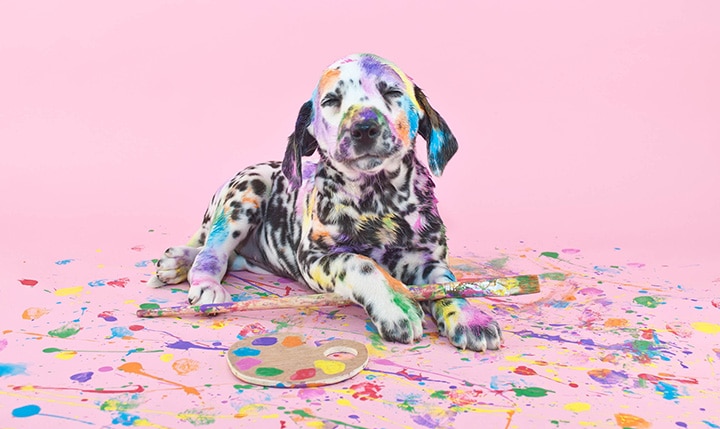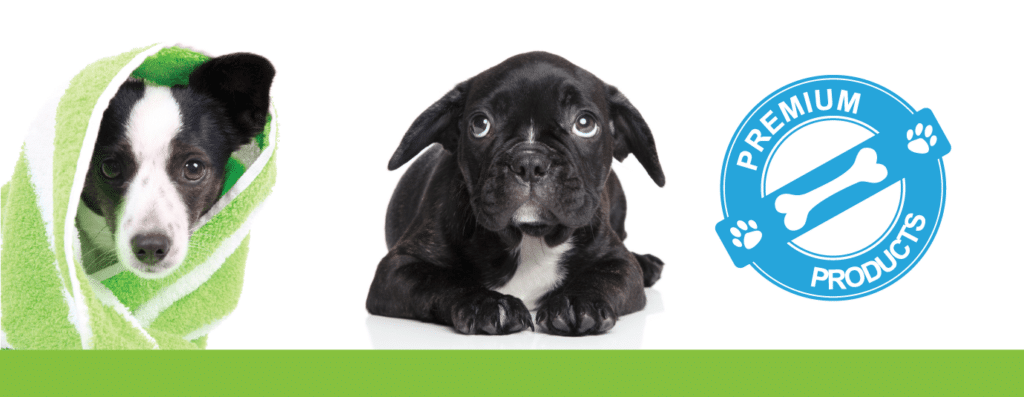One of the coolest waves to hit the pet grooming scene is pet paint! The product was originally brought to light from ABC\’s Shark Tank, but since then has been featured all over the internet and dog\’s backsides.
Pet paint really started getting popular after pet owner, and artist, Bryn Anderson first painted her dog Nixie. Anderson sprayed some white lines over her black German Shepherd and posted them on the internet. Nixie\’s fame skyrocketed from there as it quickly went viral. How could these pictures not explode over the internet? Nixie looked adorable as a doggie skeleton for Halloween! Her skeleton paint job was so cool, the now famous skeleton dog has her own Instagram and Facebook pages with thousands of followers.
Since Anderson first posted pictures of Nixie, pet parents from all over have been searching for a way to replicate this on their own dogs. Pet paint is a sensational twist on grooming that can give your pup a unique look for any occasion. Pet groomers have caught onto the trend and are offering a painting with your dog\’s bath and haircut. Many groomers and artists have made stencils that make the pet painting process even easier.
Party with Pet Paint
Fourth of July? Spray some red, white, and blue stars over-and-down your dog\’s coat and you\’ll have the star spangled barker! Christmas? Spritz a few blue snowflakes on him, or maybe even design a Santa\’s little elf costume without the hassle and discomfort of forcing your dog to get into a fabric costume. What about Halloween? With pet paint, you can make an artistic rendering of lions, tigers, and…a zombie! Numbered stencils make it easy for you to transform your dog into a football or baseball player. Or, with some creativity, you can dress them as the ball itself.
The ideas are endless and even if you\’re stumped, a few clicks around the internet open the doors for dozens of awesome ideas for your festive doggie.
Are There Any Safety Issues?
First off, pet paint is not house paint.
Regular oil-based paint contains a slew of chemicals and carcinogens like toluene and formaldehyde. These chemicals are downright toxic for dogs. While humans can endure through painting the house by opening windows for ventilation, this is not always the case for our four-legged companions. If you paint the house, be cautious with your dogs. You might even think about letting a friend watch them for the weekend or taking them to doggie boarding.
Non-toxic pet safe paint does not contain the same resins, pigment, additives, or solvents that household paint formulas have. Make sure you\’re using a safe non-toxic pet paint if you choose to decorate your dog!
Use a brand that is veterinarian approved and has been rigorously tested to ensure its ability to last and overall safety. Pay careful attention to customer reviews when purchasing pet paint. Most pet paint brands on the market are safe and non-toxic, but not all of them are easy to use. Products come in ink blow, marker pens, and spritzing paint forms.
Depending on your dog\’s coat(wiry or silky), using marker pens for paint application can be difficult. You might want to consider letting your trained groomer handle the painting for your dog\’s safety and for a professional quality paint job.
There are only a handful of trusted pet paints out there.
Trusted Brands:
- PetPaint
- PetPerri
- Pony Paints (Grooming Chalk For Horses)
- Bark Art
Safety Tips to Keep In Mind
Use pet safe paint!
We love our pets and it\’s our duty to keep them safe. Most brands on the market are veterinarian approved but the specifics of this claim are vague. If you have questions about pet paint formulas ask your vet or groomer. You can always test the paint out on a small part of your dog\’s body before applying to a whole costume.
Try spraying a small dot—let it dry–then wash it out. This will warm your pet up to the idea and confirm that the paint will not have adverse reactions.
Where is it safe to apply?
If your dog is a fan of licking their paws, groin area, or any other part of their body—be cautious! The idea that \’what is safe for humans is also safe for our dogs\’ is a false assumption. Many dogs like the Shetland Sheepdog and Yorkshire Terrier have sensitive stomachs. Even non-toxic pet paint can possibly make them sick.
Be careful around your dog\’s face and hygienic areas too. You don\’t want to accidentally spritz paint right into their eye or any other orifice.
Measure your dog\’s patience.
If your dog is timid or anxious it might not be the best idea to paint them. Exotic grooming like this takes precision and they will need to stay still for a long time. Foreign experiences can be scary for all animals, and if your dog\’s disposition makes them easily frightened, painting them might be too stressful. Consider their tolerance and go from there.
Professional Grooming is the Best Idea
Dogs require a lot of attention to detail when it comes to grooming. Groomers use equipment like clippers and dremmels which can be scary for a dog who\’s not used to the grooming process. Reputable pet groomers are trained and certified to handle and groom animals.
This professionalism is especially important when it comes to painting our pets. Pet paint products are still relatively new. You never know what possibly dangerous ingredients comprise a pet paint formula that is beinging sold out there. Dog groomers will guarantee your pet\’s safety.
Letting a dog groomer handle the painting also comes with the benefit of knowing the paint will come out looking great. Groomers have the hands for accuracy to turn your pooch into a tiger, clown, or even a billboard!
Follow Splash and Dash Groomerie & Boutique:
- Website: http://splashanddashfordogs.com/
- Website: https://splashanddashfranchise.com/
- Facebook: https://www.facebook.com/splashanddashfordogs/
- Instagram: @splashanddashfordogs
- LinkedIn: https://www.linkedin.com/in/dan-j-barton-622ab517
- Twitter: splashanddash4dog



